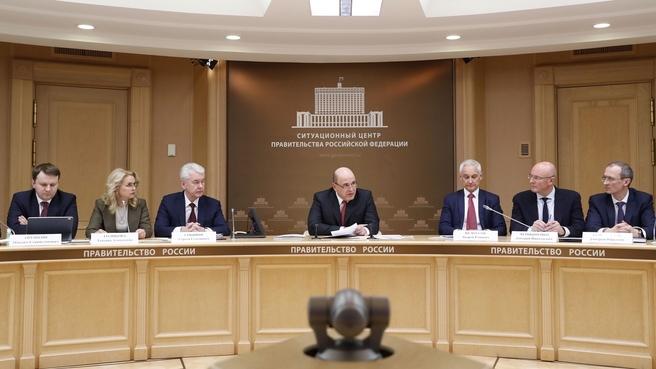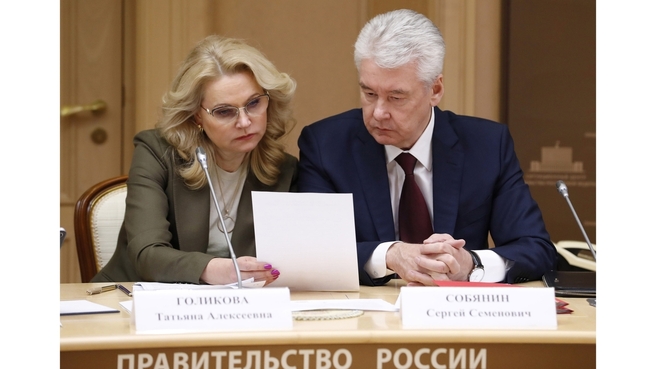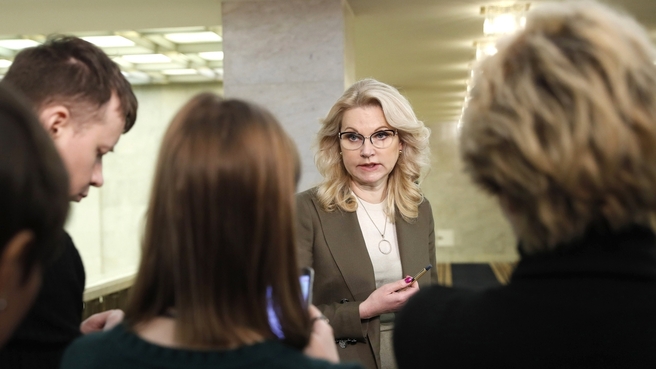Mikhail Mishustin: “The Council is to coordinate the activities of the federal, regional and municipal bodies of power, as well as all other agencies and organizations.”
Mikhail Mishustin’s opening remarks
Statement by Tatyana Golikova on measures to prevent the spread of the coronavirus
Statement by Andrei Belousov on measures to ensure a stable operation of the national economy
Briefing with Tatyana Golikova following the meeting
Excerpts from the transcript:
Mikhail Mishustin: Good afternoon, colleagues,
You know that we have established a Coordination Council to control the spread of the new coronavirus infection. We are holding its first meeting today.
We will prepare decisions on a daily basis to prevent the spread of the coronavirus and reduce its negative consequences in Russia. The Council is to coordinate the activities of the federal, regional and municipal bodies of power, as well as all other agencies and organisations.
I have signed instructions today concerning the priority measures. We discussed this at the Government meeting yesterday and at a meeting with deputy prime ministers on current issues today.
I will chair the Council. The President issued an instruction yesterday appointing Mayor Sergei Sobyanin as head of the working group set up at the State Council to counter the spread of the new coronavirus infection. Consequently, he will be first deputy chair of the Coordination Council.
Aware of the scale of the threat, the Moscow authorities were the first – and without any outside encouragement – to propose a package of proactive measures. I believe that all these decisions of the Moscow Government were substantiated and necessary in light of Moscow’s size and pace of life.
It is of exceptional importance to apply this experience in our current activities throughout the country, in each region. Mr Sobyanin, I would like to ask you to help our colleagues in the regions, in your new capacity, including when it comes to organisation and methodology.
I would like to ask you to hold a teleconference with the governors tomorrow, so that they can start taking practical measures proactively and without delay.
In addition, I will have three deputies at the Coordination Council. Tatyana Golikova will be coordinating our efforts in the social sector, primarily in healthcare, Andrei Belousov will be monitoring the situation in the economy, Dmitry Chernyshenko will be responsible for monitoring key indicators and also for the communication lines.
Today the Chief State Sanitary Physician, acting upon the instruction of the Coordination Council, has introduced a new testing procedure which has greatly expanded the opportunities of laboratory diagnosis. This concerns first of all those who want to get tested even though they are not showing any symptoms. This will be the responsibility of regional healthcare facilities. I have signed an instruction to expand coronavirus testing capabilities at airports and in railway and bus stations.
I would like to point out that keeping people informed on the developments in this area must be a key priority for the Council. The shortage of information usually breeds unnecessary concerns and unsubstantiated fears. We can already see the spread of incredible rumours that have nothing in common with the facts, and even the dissemination of openly fake news. We are working as openly as possible, and each person must have an opportunity to receive reliable and updated information via all communication channels, including television and other media, the internet and the social media. They must not lose time searching for information about the coronavirus and prevention measures, and they must know where to turn if they need assistance and have other questions. They must be able to use only one click to receive this information in clear and easily understandable terms.
Today we will listen to reports by my deputies – Tatyana Golikova, Andrei Belousov and Dmitry Chernyshenko. Let us begin.
Ms Golikova, go ahead, please.
Tatyana Golikova: Mr Mishustin, colleagues,
A total of 170,000 coronavirus cases have been registered throughout the world, including 81,000 in China and 89,000 in other countries. In all, the infection has been reported in 133 countries. Over 6,500 patients have died.
As of today, 93 coronavirus cases have been registered in Russia, of whom four have recovered and been discharged, 79 people are in hospital – 57 of them showed a benign course without any symptoms – and only two people are in a moderately grave condition suffering from shortness of breath. None of them require artificial ventilation of the lungs (AVL) or extracorporeal membrane oxygenation (ECMO) therapy. Out of these 93 cases, 86 caught the disease abroad and seven are contacts of previously confirmed cases.
The spread of the infection has been limited thanks to restrictive measures and prohibitions we took as soon as we received information about the epidemic in China.
To promptly identify vulnerable groups and those who have caught the virus, we have developed test systems and organised the testing of all people who returned from countries where it had spread.
Overall, we currently produce up to 100,000 test kits a day. We have produced nearly 710,000 test kits and dispatched 427,000 kits to the regions. Another 282,000 kits will be sent out today and also tomorrow.
We have tested over 104,000 people and the speed of the testing is getting faster. Last Saturday, we tested 33,000 people across the country, but now we plan to increase this process manifold.
As per the Prime Minister’s decision, I have issued the relevant instructions to the Federal Service for the Oversight of Consumer Protection and Welfare (Rospotrebnadzor), and the Chief State Sanitary Physician has prepared a resolution on the supply of test kits to all the Russian regions that are ready to use them at laboratories working with Risk Group 3 and 4 (RG3 and RG4) agents that will apply methods that do not provide for the extraction of the pathogen.
I would like to point out that all the regions must train their personnel and receive their consent to work with these test kits. We believe that these labs will test those who want to determine if they have or do not have the disease, provided these persons have no symptoms of the cold-related disease and have not contacted confirmed cases.
We want our people to have access to such tests so as to know and tell their relatives that they have not caught the disease.
I would like to add that all arrivals from other countries and those who have contacted them have been placed under close medical surveillance.
Over 50,000 people have been under medical surveillance since we started working on this, and 35,000 of them have been released. As of now, we are monitoring some 15,000 healthy people.
Within the next two days, the Labour and Healthcare Ministries will revise the sick leave and sick pay procedures for the quarantined people upon the instructions issued by the Prime Minister and me.
The healthcare facilities will have the right to issue sick leave to people remotely, without a medical examination of persons who have documents confirming their return from the countries where the coronavirus had spread. Similar procedures will be stipulated for those who live together with these people.
The Labour Ministry and the Social Insurance Fund will revise the sick pay procedure. The money will be transferred to the persons in question before they return from the sick leave.
We have decided that the money will be transferred every fifth working day, so that the quarantined people are not left without an income.
We have also prepared our medical facilities for any scenario. All infectious disease hospitals have been put on high alert and have prepared over 55,000 beds, including 28,000 for children, over 12,000 beds in intensive care units and 396 quarantine blocks. We have also prepared 7,500 Meltzer isolation boxes.
Our medical facilities have over 40,000 AVL systems for such patients, as well as 124 ECMO therapy systems.
We will additionally purchase more than 500 systems, including 17 systems for ECMO therapy.
We have put together the necessary medical infrastructure for the treatment of those who are infected. All our medical facilities have enough medicine for two weeks and an emergency supply of personal protective equipment. Every facility has received the recommendations and algorithm with regard to the diagnosing and treatment of the new coronavirus infection. A total of 6,000 infectious disease physicians, nearly 2,000 respiratory physicians and over 18,000 medical attendants are ready to provide assistance. If worse comes to worst, we can use the assistance of medical university and college students. In accordance with your instruction, we will submit a draft decision of the Government on additional financial benefits for medics today.
I would like to note that preliminary updates do not show any increase in the rates of pneumonia and related deaths in the period under review in 2020, and that these rates have even decreased in some regions of Russia.
The Ministry of Education and the Federal Service for the Supervision of Education and Science (Rosobrnadzor) will establish a working group for the regions, schools, colleges and directors. They will also adopt a single procedure for organising and monitoring home schooling where this is necessary.
We will also amend the schedule for the Unified State Exam (EGE). The timeframe for early exams will be revised as well. We have not yet agreed on the dates, but we will do so soon. I would like to add that the students will not suffer because of this and this will not affect the chances of their enrolment at higher schools of education.
And lastly, in light of the upcoming final stage of national school Olympiads, we will analyse the possibility to change the form and place for these events without detriment to the winners’ benefits. The Ministry of Education will keep the teachers, students and parents informed.
I would like to add that the Government has been working actively with volunteer organisations, which can help mobility impaired groups of the population in this situation.
Mikhail Mishustin: Mr Belousov, please go ahead.
Andrei Belousov: Mr Mishustin, colleagues.
Russia is in a different position compared to other countries because we are struggling with a double blow. We are affected by the drop in world oil prices from about $65 at the beginning of the year to $35 per barrel; we are affected by the instability on the global financial markets, including Europe as our largest trading partner; and we are also affected by the shrinking of some of our traditional markets in both China and Europe. So we have to deal with all of these issues in addition to the objective consequences of the restrictive measures now being introduced in our country in the same way as in other countries.
For some time, we have been analysing the various mechanisms that we could apply in these circumstances, and we came to the conclusion that the policies that the leading economies are using, such as boosting demand, are too risky for Russia today because the markets have not stabilised, and we can see a reverse effect – a sharp weakening of the rouble, which would result in predictable negative social consequences instead of stabilisation. So, as regards priority measures, we propose focusing on supporting the most vulnerable sectors and, above all, on supporting the people.
The plan includes 47 priority steps, of which 35 are urgent and need to be implemented within the next 10 days.
The plan comprises four sections. The first section concerns social support and ensuring a guaranteed supply of essential goods. I emphasise the word ‘guaranteed’ – this means, first of all, a new procedure for paying quarantined people for time spent on sick leave to ensure they are not left without money, without income. It also includes a number of measures to support trade, both small companies and large retail chains, to create sufficient stocks of essential goods to ensure uninterrupted trade. There will be financial policies aimed at facilitation of lending, and administrative measures, including quite unprecedented ones. For example, we plan to introduce a green lane at customs for basic goods for a month, for the time being, so that they reach the stores faster without the need for customs clearance.
The second section includes measures to support the industries that are most at risk. This mainly refers to air transport, tourism, to a certain extent, construction because it employs a large number of foreign workers, the leisure sector, of course, entertainment and so on. A number of other measures are planned.
In addition to direct subsidies to compensate for losses, something we will begin implementing at the end of March using previously established methods, we have also planned – I would like to specifically point this out – measures to prevent the scrapping of pre-existing credit lines. We already have examples where banks are trying to profit from certain companies in these industries that are in a difficult situation by reducing their credit. This is absolutely unacceptable. We have agreed with the Central Bank on action to address this.
The third section includes measures to support small and medium-sized companies. It also involves a range of administrative and financial measures, starting with a moratorium on inspections – with the exception of cases posing a risk for people’s lives and health. There are measures to expand SME access to soft loans; incentives for banks to grant deferrals on interest and subsidisation of interest rates by 0.5 percent of the market rate. We will grant a deferral of rental payments on state or municipal property. We are reducing security requirements for SME contracts in public procurement and taking a number of other measures.
Finally, the fourth section of the plan includes system-wide measures. First of all, a list of critically important enterprises will be compiled. We had a list during the 2008–2009 crisis and in 2014. Although this is not an economic crisis, we considered it necessary to draw up and update such a list.
These enterprises will be under special supervision. A special commission has been created. If necessary, companies will be able to apply to the commission and receive prompt support in restructuring their loans and debts or even direct subsidies, if such a need arises in connection with the spread of coronavirus.
We will introduce the force majeure mode on government procurement and on certain types of refund on foreign currency earnings in cases where foreign importers purchasing Russian goods fail to pay Russian companies promptly. We will also build up a financial reserve to fund the measures we propose.
We assume, at this point, that approximately 300 billion roubles may be enough, plus some guarantee fund, but of course, if necessary, the government is fully equipped to exceed this amount.
Mikhail Mishustin: Mr Chernyshenko, please go ahead.
Dmitry Chernyshenko: Mr Mishustin, members of the Coordinating Council,
As per your instructions, a Communications Centre has been established under the Coordinating Council to monitor the situation, render information support, and coordinate [the moves of] all participants. Its main aim is to be one-stop shop that will pool resources for prompt decision-making and accident management. It will also escalate them in time to the level of the Coordinating Council and the State Council’s Working Group. The Centre will operate on a 24/7 basis and coordinate the activities of ministries and agencies, including those in the regions. It will monitor social, economic and industrial indices round the clock, including availability of consumer goods and medications. It is also important to track such parameters as availability of individual protective equipment, medical tests, and quarantine measures. Our work will also be based on public opinion monitoring and feedback. The Centre will have its first report ready by 06.30 am so that everyone has the latest update.
It is extremely important to analyse and study the existing best practices that other countries have evolved while combating the coronavirus, starting with the first hotbed of the disease and then looking at how it is spreading around the world. It is necessary to analyse measures imposed by the authorities, the public reaction to them, and the relevant recommendations. The Centre is also handling this.
We are working with businesses to inculcate a responsible attitude to employees, with help on offer if the epidemic spreads. Many companies have taken this into consideration, are conducting explanatory work via their communications channels, and are switching to working from home. Jointly with Tatyana Golikova’s centre, the Federal Agency for Youth Affairs, and the Association of Volunteer Centres, we are organising a national movement to help those in quarantine and senior citizens. It is also important to enlist medical professionals as volunteers.
Yet another objective is to inform people about coronavirus prevention and to refute rumours and false information. All information on the Commission’s activities will be posted on the Стопкоронавирус.рф (Stopcoronavirus.rf) website, which will reflect the real picture in Russia and elsewhere. We have also made and tested a single free hotline, Стопкоронавирус, (Stopcoronavirus) number 8-800-2000-112. If you give us the go-ahead, we are ready to launch it.
Mikhail Mishustin: Yes, of course!
<…>














